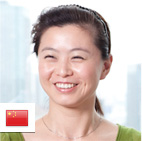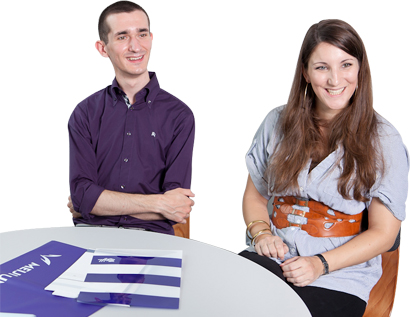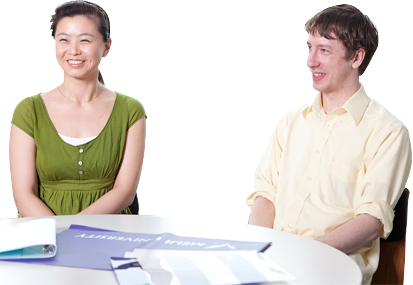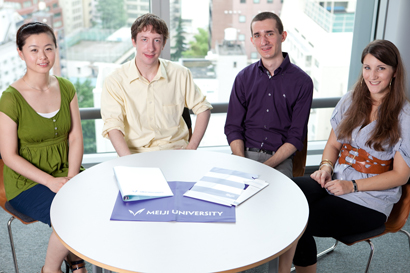
Switzerland, Aaran
School of Global Japanese Studies
Exchange student from The University of Zurich

Bulgaria, Sofia
School of Political Science and Economics
Exchange student from The University of Sheffield

China, Liaoning
School of Business Administration

USA, Illinois
Graduate School of Arts and Letters
Why did you choose to study abroad at a Japanese university?
Sean: I was studying about Japan at Iowa State University and so thought I'd like to study abroad in Japan. In addition to Meiji University, there are many other universities, however, Meiji doesn't just offer a general exchange program course, but students are able to do specialized study and this attracted me.
Jacqueline: My major is Japanese Studies and I came to Japan because I wanted to study Japanese. I chose Meiji University because it has a school of Global Japanese Studies.
Alexander: My majors are Japanese Studies and Politics. I heard the school of Political and Economic at Meiji University is very good, so I chose to study here.
Zhang: In my case, after coming to Japan I attended a Japanese language school for 2 years. After that, I wanted to go to a higher level university, but in order to be accepted, I needed good grades in English. In China, I had studied English since junior high school, but went to a vocational college to study English for 2 years and after that entered Meiji University.
Why did you choose Meiji University?

Zhang: During my time at the vocational college, I had my first TOEIC exam and it was held at Meiji University's campus. It was my first time to take an examination in Japan, but I thought that if I was going to go to university, I wanted to go to Meiji. Also, I looked at the recruiting information from various universities, but my vocational school teacher recommended Meiji.
Also, Meiji University had the image of allowing students to do what they want. And, after entering Meiji, I discovered that this image was indeed true. At Meiji University, there are many fields that are available at a general university. Also, there are students with various ways of thinking and the university provides an environment that supports them in doing what they want.
Sean: I was interested in Japanese universities and I was also influenced by one of my teachers who had graduated from Meiji University. Also, Meiji University had both the specialty I wanted to study and teachers I wanted to learn from.
Alexander: I was told by my older friend who was a student a Meiji University that it was a great university, and so I decided to apply.
Jacqueline: In my case also, an older friend and a teachers recommended Meiji University. From my own research on the internet, there seemed to be good teachers and subjects I wanted to take classes in, so I chose Meiji University.
What is the biggest challenge for foreign students in Japan?
Alexander: I was worried most about kanji. But, it's ok now.
Zhang: For me, it was the first time to be apart from my parents, so it was a challenge for me to live by myself. After that, language.
Jacqueline: It was language for me too. When taking classes in Japanese, there were words I didn't understand, and it was very difficult. Especially when the topic was about economics, there was a lot of specialized vocabulary.
Sean: For me also, it was living abroad. I hadn't had much experience abroad, and I came from far away. Back in my home country, the university I was attending was not close to my home, but I could go back home within a day.
But, now, it's not like that. However, when I first came as a foreign exchange student, everyone gave me great support, and now I feel confident to survive anywhere.
How long ago did you start preparing to study abroad?
Zhang: One year before I arrived in Japan. It was difficult to get a visa. I failed on the first attempt, but got it on the second. After that, I worked and studied in China for 8 months and prepared to come psychologically.
Sean: From the time I entered university in my home country, I decided to study abroad, and was studying for 3 and a half years. The preparations for the actual procedures took me half a year before coming to Japan.
Alexander: The procedures took half a year before coming to Japan. I was also studying the language for 2 years before coming.
Jacqueline: I also wanted to study abroad and spent 2 years studying. The procedures took half a year.
Please tell us about the differences between Meiji University and the university in your home country.
Sean: The university I was attending in my home country was in the countryside, so Meiji University, which is in a big city, felt very different.
At first, I couldn't get used to being at a big city university. Meiji has many tall buildings and is compact, whereas I was used to a very large and spread out university campus.
Jacqueline: My home country university in Switzerland also had a very large campus. So things like the size of the campus and the atmosphere of the buildings are different to Meiji University. The buildings in Japan are new and modern, but the ones in my home country's university are very old.
Also, at Japanese universities, club and social circle actives are very much emphasized and the campus atmosphere is very bright. I often hang out with the people from my courses, go drinking together, it's a lot of fun.
Alexander: The buildings of the universities in England are also very old. Meiji University's buildings are modern, big and spacious. The atmosphere of the classes is similar.
Zhang: The university in my home country was far from the city center, but Meiji University is in the city center and transportation access is very good. It depends on which campus you are attending, but my campus in Ochanomizu is very conveniently located.
To get to the university in my home country, I had to take a bus for one hour. Many students would rent an apartment near the university and live there.
I think that for international students, travel time and access are very important.
Are there any Japanese customs which you felt different to those in your home country?

Alexander: The thing which shocked me the most was the morning rush hour. Every day, I change trains at Shinjuku Station, but the first time I was really shocked. Now I've gotten used to it.
Jacqueline: I was also shocked by the commuting rush hour. Especially at Shinjuku Station.
Sean: I couldn't get used to the transportation system. On my first day commuting to school, the train was delayed due to an accident, I was very stressed. But, now I know it's something that happens often. So now I don't worry.
Zhang: I didn't feel any major culture shock. In China, my home was far from my school and workplace, and there was a commuting rush, so it wasn't much different from Tokyo.
However, there was one thing that surprised me, and it may only be in Tokyo, but that was the tiny distance between buildings. The apartment building next to mine is so close that if my neighbor opens their window at the same time we could shake hands (laughs). In China, it's a similar environment in the south, but where I was born in the north, there is a set minimum distance between buildings.
What was the most interesting thing about Japanese culture?
Sean: I'm interested in art and literature. I'm also researching about it now and am very interested in how printed materials are used to transmit culture. Within that, I'm consuming so many books that I'm becoming a book addict about topics such as what kind of language people use and using new language to communicate new things.
Jacqueline: Before, I was doing Jujitsu, and I have always been interested in Bushido and Budo. And, I'm interested in that way of thinking, and read Miyamoto Musashi's book.
Alexander: I'm interested in Japanese cuisine. From the time I was in Europe, I was going to Japanese restaurants, however coming to Japan I was able to experience authentic Japanese cuisine, and was surprised to learn that it was totally different to the Japanese food in Europe. Real Japanese food is very delicious. The sushi in Europe is not sushi (laughs). In Japan, I went to various restaurants, and it was really fun trying authentic Japanese food. It's difficult to make by myself, but I sometimes do.
Zhang: For me very recently, I've become interested in the tea ceremony. One of my colleagues at my part time job was doing tea ceremony at their home and invited 5 international students from Meiji University to their home and I was really moved. Not one word was spoken, but the way they made the tea and the gestures were wonderful. What I gained from seeing the tea ceremony's way of making tea and philosophy was deeper than I could gain from school or cinemas. The students there, from China, Korea, America and Europe, all felt the same way. It was a very important experience. Someday, I'd like to learn Japanese tea ceremony.
What image did you have of Japanese culture before you came to Japan? Did your impression change after you came to Japan?

Alexander: I had the image of the food being delicious. However, the real thing was even more delicious!
Zhang: For me, before and after I came to Japan, my impression didn't change much.
I was working in a hotel in China and there were many Japanese guests, so I had many opportunities to come into contact with Japanese people. There were also two Japanese exchange students working there. So, I had a fairly good idea of what Japan and Japanese people were like.
Jacqueline: My impression also didn't change. I had the image of Japanese people being kind and gentle, and found it to be true. I first came to Japan 4 years ago. At that time, I was in Iwate Prefecture. Iwate Prefecture is very much countryside and the people weren't used to foreigners, but they were very kind.
Sean: I had heard that in many Japanese schools the students wore uniforms, so I supposed that Japanese schools were quite somber places. But, when I came, I found them to be quite bright and everyone was fun -- the total opposite to what I had expected.
Are you participating in a club or social circle?
Sean: Before, I was participating in an art-related circle, and international exchange circle, and also joined the Meiji University foreign students' speech contest. Currently, I am mostly involved in academic meetings. The academic meetings are held in various places, and I get the chance to visit places I haven't been before, and hear various points of view, so it's good.
Jacqueline: I wanted to join in club activities and social circles, but there were so many to choose from that I got confused and in the end didn't choose any. However, I did join a group called "Campus Mate" which is a circle for international exchange that supports the lifestyles of international students.
Alexander: I also joined Campus Mate. They have a drinking party two or three times per month.
Zhang: In the second half of my first year, I joined the Mei-chu-kai (Meiji Chinese Students Association), and helped with its administration. Each year, they have a barbecue party and plan trips. There were students from other countries as members also and it was fun. I've decided my role for 1-year, so now I only join when they ask me to.
At Meiji University, there is an international exchange center, and they organize activities such as bus tours to Kabuki theaters. So, whenever I have time, I make every effort to join. Meiji University gives us all kinds of opportunities, so to not use them is a waste!
What path will you take after graduation?

Sean: I am already a post graduate student and must complete a further 2 to 3 years of study in order to complete my masters degree. After that, I intend to study further, so it may take me 3 or 4 years to graduate with my PHD. In the future, I would like to someday become a university teacher, but have not decided where I'll go. I still have lots of time, and my teachers are telling me to focus on studying.
Jacqueline: After I graduate, I'd like to return to my home country and learn in a post graduate course. Also, I'd like to come to Japan again.
Alexander: In September, I will return to England, study for one more year, and after graduating university, I'd like to continue to post graduate study. I haven't decided, but I think it would be good if it were Meiji University.
Zhang: I have decided to continue to post graduate study at Meiji University. If I can complete my masters degree in 2 years, depending on my feeling and situation at the time, I would like to study for my PHD. What I'd like to study as a post graduate is East Asian business, especially the difference between Chinese and Japanese business and economic management methods.
Until now, Japan and other developed countries have set up factories and branch offices in China, and China has become known as "the world's factory". However, viewing economic development, and this is my personal opinion, in the future, maybe 10 or 20 years later, this will change and the Chinese government and private enterprises will start to become active overseas. I think it will be a time when Chinese will bring a different culture and management style to foreign counties. When that time comes, I would like to put to good use my experience as an international student, language skills, and the things I studied and experienced at Meiji University.













